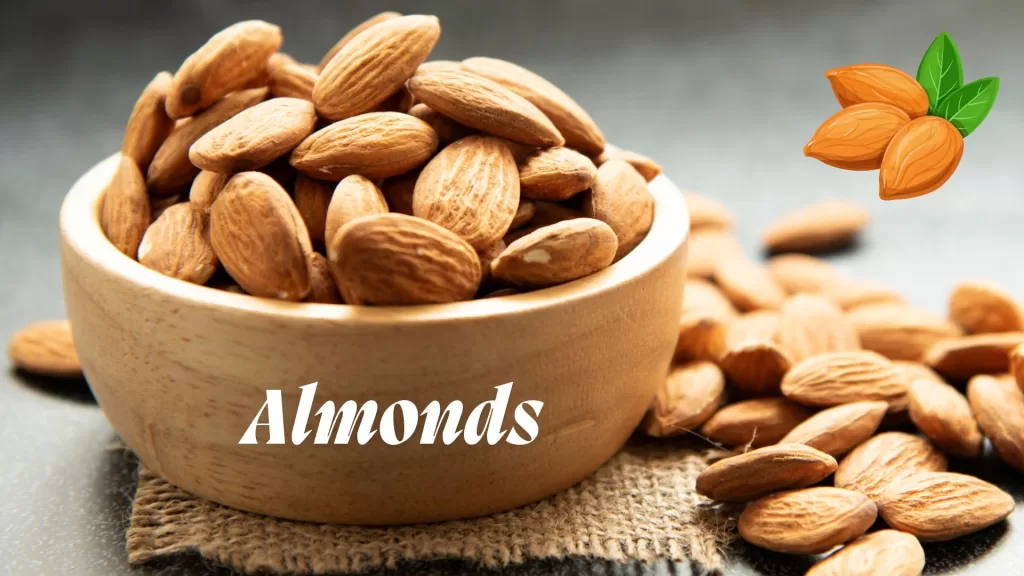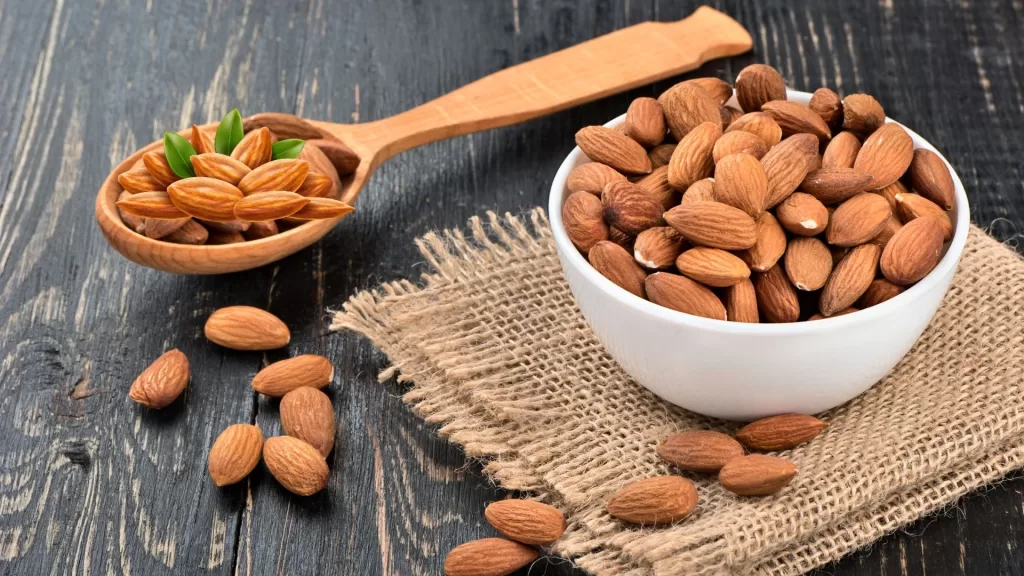10 health advantages of almonds: Are you seeking a simple solution to increase your health that’s both tasty and convenient? Look no further than the simple almond. These little but big nuts have been adored for ages, not merely for their wonderful flavor but also their astonishing variety of health benefits.
Almonds aren’t just a nice snack — they’re nutritional powerhouses filled with critical vitamins, minerals, healthy fats, and protein. Whether you like them as a fast snack, blended into smoothies, or sprinkled over your daily porridge, almonds provide an astounding variety of 10 health benefits that may surprise you.

In this comprehensive guide, we’ll explore the amazing 10 health benefits of almonds that make them truly deserving of their “superfood” status. From heart health to skin care, these versatile nuts have something to offer everyone. Let’s crack open the wonderful world of almonds and discover why they deserve a permanent place in your pantry!
Key Points: The Power of Almonds
Before we dive into all the details about the 10 health benefits of almonds, here’s a quick summary of what makes these nuts so special:
- ✅ Heart Health Champion: Almonds may decrease bad (LDL) cholesterol while maintaining good (HDL) cholesterol levels.
- ✅ Blood Sugar: Almonds include magnesium and fiber, which help manage blood sugar levels.
- ✅ Weight Management: Almonds may aid with weight control, despite their high calorie content.
- ✅ Antioxidant Powerhouse: Contains vitamin E and plant components that combat oxidative stress.
- ✅ Bone Strengthener: Contains calcium, magnesium, and other minerals required for bone health.
- ✅ Brain Booster: Nutrients promote cognitive performance and may prevent deterioration.
- ✅ Digestive Health Supporter: Supports digestive health with prebiotics that nourish the gut microbiota.
- ✅ Skin Beautifier: Nutrients in almonds promote healthy, young skin.
- ✅ Energy Provider: Provides a balanced mix of protein, healthy fats, and fiber for prolonged energy.
- ✅ Cancer Fighter: Contains chemicals that may lower cancer risk.
An Introduction: Health Benefits of Almonds
Almonds are a wise option if you’re seeking a little snack with great value. Your body values the protein, fiber, good fats, vitamins, and minerals these nutrient-dense nuts contain. Almonds are very beneficial for your general health, whether you consume them raw, roasted, or combined into almond butter or milk. From aiding weight control and bettering heart health to promoting cognitive function and skin radiance, almonds are very flexible and potent.
Perfect for both heart health and good snacking, only a handful of almonds per day may help cut bad cholesterol, control blood sugar, and prolong feelings of fullness. Rich in vitamin E and antioxidants as well, they help to encourage good aging and protect your cells. They also fit well with any diet as they are plant-based and naturally gluten-free.
Including almonds in your daily regimen is a terrific start if you want to live well with little effort. One crunchy mouthful at a time, you will learn in the sections that follow the best health advantages of almonds and how they may help you feel better, look better, and live stronger.
What Are Almonds?
Before going into the 10 health advantages of almonds, let’s get to know these nuts a little better.
Almonds are the seeds of the Prunus dulcis tree, a medium-sized tree that belongs to the same family as peaches and cherries. Technically, almonds aren’t actual nuts but drupes — fruits having an outer hull and a hard shell housing the seed. What we consume as an “almond” is the seed of this fruit!
Native to the Middle East and South Asia, almonds have been farmed for thousands of years. Archaeological evidence reveals people have been eating almonds since at least 3000 BCE. Today, California produces roughly 80% of the world’s almonds, with Spain and Australia also being key producers.
You’ll find several varieties in stores:
- Raw almonds (natural and untreated)
- Roasted almonds (dry or oil-roasted)
- Blanched almonds (with skins removed)
- Slivered, sliced, or chopped almonds
- Almond flour, butter, and milk
No matter how you enjoy them, you’re tapping into thousands of years of nutritional wisdom!
10 Health Benefits of Almonds
Now let’s explore each of these amazing benefits in greater detail!

1. Heart Health Benefits
One of the most well-studied advantages of almonds is their beneficial influence on cardiovascular health. Regular eating of these nuts has been related to improved cholesterol levels and general cardiovascular health.
Almonds include monounsaturated fats, the same heart-healthy lipids found in olive oil, which have been proven to lower levels of bad LDL cholesterol while preserving or even raising helpful HDL cholesterol. This positive change in cholesterol balance is critical for lowering the risk of heart disease.
A major research study published in the Journal of the American Heart Association discovered that individuals who ate 1.5 ounces of almonds each day for six weeks lowered their LDL cholesterol by an average of 5.3 mg/dl. Many subjects reported a decrease in dangerous belly fat.
Dr. Sarah Thompson, a cardiologist at Cleveland Medical Center, says that the combination of good fats, vitamin E, and plant sterols in almonds presents a triple threat against heart disease. Just a handful each day may have a big influence on heart health parameters.
2. Blood Sugar Regulation
If you’re worried about blood sugar levels, almonds could become your new best buddy. Their particular nutritional composition makes them a great diet for blood sugar control.
Almonds are filled with magnesium, a mineral that plays a critical role in over 300 biological functions, including blood sugar management. In fact, just one ounce of almonds offers approximately 20% of your daily magnesium requirements. Studies have revealed that many persons with type 2 diabetes have low magnesium levels, and treating this deficit may enhance insulin action and blood sugar management.
Additionally, almonds are low in digestible carbs but abundant in protein and fiber – a combination that helps avoid blood sugar increases after meals. When you consume almonds with carbohydrate-rich items, they may help lessen the overall glycemic effect of your meal.
Research in the Journal of Nutrition revealed that ingesting almonds with a high-carbohydrate meal lowered post-meal blood sugar increases by up to 30% in persons with type 2 diabetes. That’s a substantial advantage from merely adding a modest handful of almonds to your diet!
3. Weight Management
It may seem strange that a calorie-dense meal like almonds should aid with weight control, but that’s precisely what research shows. Almonds may be a great ally in maintaining a healthy weight for various reasons.
First, the protein and fiber in almonds can improve feelings of fullness, which helps reduce overeating. A research in the European Journal of Clinical Nutrition revealed that individuals who ate almonds as a mid-morning snack reported feeling fuller and ended up ingesting less calories throughout the day.
Second, research has revealed that our bodies don’t absorb all the calories in almonds. Their cellular structure means that roughly 10-15% of their calories travel through the digestive system without being absorbed — a pleasant little bonus!
Perhaps most curiously, those who consistently include nuts like almonds in their diets tend to have lower body weights and less central adiposity (belly fat) than those who don’t consume nuts. This may be because almonds assist in improving metabolism somewhat and give sustained energy that supports an active lifestyle.
As dietitian Emma Rodriguez puts it: “Almonds are the ideal illustration of why we shouldn’t fear calories from full, nutrient-dense meals. Their particular mix of nutrients and satiety characteristics makes them a weight control ally, not an adversary.”
4. Rich Source of Antioxidants
Oxidative stress is linked in aging and many chronic illnesses. Luckily, almonds are filled with antioxidants that help prevent this damage — notably in the brown skin of the nut.
Vitamin E is the major antioxidant in almonds, with one ounce supplying around 48% of the daily required dose. As a potent fat-soluble antioxidant, vitamin E protects your cells’ membranes from damage and has been linked to decreased incidences of heart disease, cancer, and Alzheimer’s disease.
But vitamin E isn’t functioning alone. Almonds also contain flavonoids and other plant components that act synergistically to give antioxidant defense. Research has indicated that ingesting almonds with meals helps minimize signs of oxidative damage, especially after high-fat or high-carbohydrate meals.
Interestingly, toasting almonds doesn’t greatly lower their antioxidant levels; it may potentially make certain antioxidants more accessible. However, blanched almonds (with the skin removed) have substantially less antioxidant capacity; therefore, select almonds with the skin intact for optimal advantages.
5. Bone Health Support
Strong, healthy bones require more than just calcium – they need a constellation of minerals working together, and almonds provide many of them.
A one-ounce serving of almonds delivers around 75 mg of calcium (about 8% of your daily needs), 76 mg of magnesium (around 20% of daily needs), as well as manganese and copper – all minerals that play essential roles in bone formation and strength.
Phosphorus, another mineral abundant in almonds, works with calcium to build and maintain bone structure. The healthy balance of minerals in almonds helps support not just bone density but also bone quality and resilience.
Research published in the journal Nutrients has suggested that regular nut consumption, including almonds, is associated with higher bone mineral density, which is especially important as we age and face an increased risk of osteoporosis.
Dr. Michael Chen, an orthopedic specialist, notes: “We often focus solely on calcium for bone health, but minerals like magnesium and phosphorus are equally important. Almonds provide this balanced mineral profile that supports comprehensive bone health far better than single-nutrient supplements.”
6. Brain Health and Cognitive Function
Your brain loves almonds! These nuts contain several nutrients that support cognitive function and may help protect against age-related cognitive decline.
Almonds are rich in vitamin E, which has been studied for its neuroprotective effects. Research published in the Journal of the American Medical Association found that vitamin E might help slow the progression of Alzheimer’s disease in some patients, and those with higher vitamin E intake generally had lower rates of cognitive decline as they aged.
The healthy fats in almonds, particularly the omega-3 fatty acids, also support brain health. These fats are integral components of brain cell membranes and are involved in neurotransmitter function.
Additionally, the riboflavin (vitamin B2) and L-carnitine in almonds support overall brain health and may help reduce inflammation in the brain – a factor increasingly linked to cognitive diseases.
“The brain-boosting effects of almonds aren’t immediate like caffeine,” explains neuroscientist Dr. Jennifer Lee. “Rather, they provide long-term nourishment to brain structures and neurotransmitter systems that support cognitive resilience as we age. Think of them as a long-term investment in your brain health.”
7. Gut Health Improvement
A healthy gut microbiota is increasingly recognized as vital for general health, and almonds may play a supporting role in nourishing your beneficial gut flora.
Almonds are rich in prebiotic fiber — the sort that feeds your friendly gut flora. As these bacteria digest the fiber from almonds, they form beneficial short-chain fatty acids that feed your gut lining and help decrease inflammation.
In a research published in the journal Nutrition Research, taking 56 grams (approximately 1/4 cup) of almonds daily for eight weeks led to substantial increases in good gut bacteria, notably Bifidobacteria and Lactobacillus species linked with improved digestive and immunological health.
The skin of almonds includes polyphenols that may potentially serve as prebiotics and have antibacterial capabilities against dangerous microorganisms. This dual action helps establish a healthy intestinal ecology.
For people worried about digestive comfort, soaking almonds before eating them may make them more digestible by lowering their phytic acid level and softening their texture.
8. Skin Health Benefits
Want glowing skin? Almonds might be one of your best dietary allies, thanks to their unique nutritional profile that supports skin health from the inside out.
Vitamin E, abundant in almonds, is a powerful antioxidant that helps protect skin cells from UV damage and other environmental stressors. It also helps maintain skin moisture and may reduce signs of aging. A 2019 study found that women who consumed almonds daily for 16 weeks showed significantly reduced wrinkle severity and improved skin tone compared to those who ate a nut-free snack.
The healthy fats in almonds help maintain your skin’s moisture barrier, resulting in softer, more hydrated skin. These fats also help your body absorb fat-soluble vitamins (including vitamin E) that support skin health.
Beyond eating them, almond oil is widely used in skincare products for its gentle moisturizing properties. It’s particularly beneficial for sensitive skin and can help soothe conditions like eczema and psoriasis.
Beauty expert Lisa Washington shares: “Many expensive skincare products contain vitamin E and healthy oils – the same nutrients found naturally in almonds. Consuming almonds regularly provides these nutrients to your skin from within, which is often more effective than topical application alone.”
9. Energy Boost and Muscle Support
Looking for prolonged energy without the crash that comes with sugary snacks? Almonds offer a great blend of nutrients to keep you energetic throughout the day.
The protein level in almonds (approximately 6 grams per ounce) makes them an ideal snack for muscle rehabilitation after exercise. Protein is needed for repairing and growing muscle tissue, and the branched-chain amino acids in almonds aid in this process.
Unlike simple carbs that create energy spikes and crashes, the combination of protein, healthy fats, and fiber in almonds gives slow-release energy. This ensures steady blood sugar levels and sustained energy, excellent for hectic days or endurance exercises.
Almonds also include riboflavin (vitamin B2) and copper, which play vital roles in energy synthesis at the cellular level. These nutrients help your body effectively transform meals into usable energy.
Many athletes and fitness aficionados include almonds in their gym bags for this reason. As fitness instructor Brandon Miller explains: “Almonds are my go-to advice for pre- or post-workout nourishment. They don’t require refrigeration, won’t crush in your backpack, and give the right blend of nutrients for continuous energy and recuperation.”
10. Cancer Risk Reduction
While no one meal may prevent cancer, evidence shows that almonds may add to an overall diet that helps lower cancer risk.
Almonds contain numerous chemicals with possible anti-cancer effects. Their high vitamin E concentration functions as an antioxidant that helps protect cells from DNA damage that may contribute to cancer growth. Studies have associated increased vitamin E consumption with decreased incidences of some malignancies, including breast and prostate cancer.
Additionally, almonds contain bioactive compounds called phytosterols, which have been researched for their ability to suppress tumor development and spread, notably in breast and colon malignancies.
A major observational study published in the International Journal of Cancer indicated that increased nut intake, particularly almonds, was associated with considerably decreased risk of some malignancies, notably colon cancer.
The fiber in almonds also has a role in cancer prevention, especially for colorectal cancer, by encouraging good digestion and limiting exposure of the intestinal lining to possible carcinogens.
Nutritional Profile of Almonds
Understanding the impressive 10 health benefits of almonds starts with knowing their nutritional composition. Here’s a comprehensive breakdown of what you’ll find in a typical one-ounce serving (about 23 almonds):

| Nutrient | Amount | % Daily Value* |
|---|---|---|
| Calories | 164 | – |
| Protein | 6g | 12% |
| Total Fat | 14g | 18% |
| – Monounsaturated Fat | 9g | – |
| – Polyunsaturated Fat | 3.5g | – |
| – Saturated Fat | 1g | 5% |
| Carbohydrates | 6g | 2% |
| Fiber | 3.5g | 13% |
| Vitamin E | 7.3mg | 48% |
| Manganese | 0.6mg | 27% |
| Magnesium | 76mg | 18% |
| Riboflavin (B2) | 0.3mg | 17% |
| Phosphorus | 136mg | 14% |
| Calcium | 76mg | 8% |
| Iron | 1mg | 6% |
| Potassium | 208mg | 6% |
| Zinc | 0.9mg | 8% |
| Copper | 0.3mg | 33% |
*Based on a 2,000-calorie diet
This nutrient density is what makes almonds such a powerful food and explains the impressive 10 health benefits of almonds we’ve explored. Just a small handful delivers significant amounts of essential nutrients that support multiple body systems.
How to Incorporate Almonds into Your Diet
Now that you know the impressive 10 health benefits of almonds, you might be wondering about the best ways to include them in your daily routine. Here are some delicious and creative ideas:

Different Ways to Consume Almonds
- Raw or Roasted Snacking
- Keep a small package of almonds in your backpack, workplace, or vehicle for a handy, healthy snack.
- Try them gently salted, seasoned, or plain according to your liking.
- Almond Butter
- Spread over toast, apple slices, or celery.
- Blend into smoothies for additional creaminess and nutrients.
- Use in salad dressings or sauces for a rich texture.
- Almond Flour
- Perfect for gluten-free baking.
- Makes wonderful pancakes, muffins, and cookies with a nutty taste.
- Use as a breadcrumb replacement for a crispy coating on fish or poultry.
- Almond Milk
- A dairy-free substitute for smoothies, coffee, or porridge.
- Use in recipes for baking and cooking.
- Make your own at home without any additives for a fresher flavor.
- Almond Toppings
- Add chopped or sliced almonds to ice cream, yogurt, cereal, and salads.
- Give roasted veggies or stir-fries some crunch.
- Add to recipes for trail mix or granola.
Recommended Daily Intake
Most health experts recommend consuming 1-1.5 ounces of almonds daily (about 23-35 almonds) to experience the 10 health benefits of almonds without overdoing calorie intake. This amount provides significant nutritional benefits while still being appropriate for most balanced diets.
Dietitian Maria Rodriguez advises: “Portion control is important with almonds because they’re calorie-dense. I recommend measuring out your daily portion in the morning and keeping it in a small container. This prevents mindless overeating while still ensuring you get all the health benefits.”
Simple Recipes with Almonds
Energizing Almond Breakfast Bowl
- Half a cup of cooked steel-cut oats.
- One spoonful of almond butter.
- One tablespoon of almonds, chopped.
- Half a banana, sliced.
- A dash of cinnamon.
- Honey drizzle (optional).
Simply combine all ingredients in a bowl and enjoy a nutrient-packed start to your day!
Mediterranean Almond Pesto
- 1 cup fresh basil
- ¼ cup toasted almonds
- 2 cloves garlic
- ⅓ cup olive oil
- ¼ cup grated Parmesan cheese
- Salt and pepper to taste
Blend all ingredients in a food processor until smooth. Perfect for pasta, sandwiches, or as a dip!
Almond-Crusted Baked Chicken
- 2 chicken breasts
- ½ cup ground almonds
- 2 tablespoons Parmesan cheese
- 1 teaspoon dried herbs (thyme, rosemary, or Italian seasoning)
- 1 egg, beaten
- Salt and pepper to taste
Dip chicken in egg, then coat with the almond mixture. Bake at 375°F for 25-30 minutes until golden and cooked through.
Almond Benefits for Men
Though small, almonds offer significant power, especially for males attempting to enhance their health naturally. Rich in critical nutrients including protein, healthy fats, vitamin E, magnesium, and zinc, almonds offer several benefits for a man’s body and mind.

Heart health is among the clear benefits. Monounsaturated fats found in almonds help lower bad cholesterol (LDL) and promote good blood flow, key for avoiding heart disease, which still causes great worry for men as they age.
Almonds are an excellent source of plant-based protein and magnesium for people who concentrate on muscular strength and fitness. Almonds are a perfect post-workout snack as these nutrients are mostly important for energy generation and muscle rehabilitation.
Almonds also help to maintain hormonal balance, due to their high zinc concentration. Zinc helps testosterone levels, which are vital for mood, energy, and sexual health.
Moreover, almonds’ vitamin E is a potent antioxidant that supports skin health and helps combat oxidative stress, thus preserving your skin and feel young.
Without going overboard on calories, adding only a handful—about 23 almonds—a day to your diet may have these amazing effects. Eat them raw, roasted, or mixed into smoothies—however you prefer them most.
In essence, almonds are a wise, basic option for guys trying to organically and wonderfully enhance their health.
Almond Benefits for Skin
Almonds aren’t simply a nutritious snack—they’re a skincare powerhouse too. Packed with skin-loving nutrients, almonds help you shine from the inside out.

First up: Vitamin E. Almonds are one of the greatest natural sources of this antioxidant, which protects your skin from UV damage, pollution, and indications of premature aging. Regular consumption of almonds may help decrease fine lines, wrinkles, and dullness, giving your skin a smoother, younger look.
Next, let’s discuss good fats. The monounsaturated fats in almonds feed your skin cells, keeping them plump and nourished. This means fewer dry spots and a smoother texture overall, especially useful during colder months or for persons with already dry skin.
Almonds are also high in zinc, which plays a significant role in curing acne and reducing oil production. If you battle with breakouts, adding almonds to your routine may help reduce inflammation from the inside.
Don’t forget about magnesium—a stress-fighting element that also helps boost blood circulation. Better circulation means more oxygen and nutrients are given to your skin, resulting in a natural, healthy glow.
For a double boost, you may consume almonds and apply almond oil topically. It’s lightweight, non-greasy, and wonderful for hydrating, calming inflammation, and even lightening dark circles.
Almond Benefits for Hair
If you’re dreaming of strong, lustrous, and healthy hair, almonds could be your new best friend. These small nuts are rich with nutrients that perform wonders for your hair from root to tip.

First and foremost, almonds are rich in biotin, a B-vitamin widely recognized for boosting hair development and decreasing hair loss. Just a little handful of almonds every day may provide your body with a natural dosage of this hair-strengthening vitamin.
Another hair-loving element found in almonds is magnesium. Magnesium deficiency is typically associated with hair loss and poor hair development. By keeping your scalp healthy and blood flow dynamic, magnesium stimulates the development of thicker, fuller hair over time.
Vitamin E is another prominent player. This strong antioxidant helps restore hair follicles, protects damage from UV radiation and pollutants, and provides a healthy sheen to your strands. It also nourishes the scalp, eliminating dryness and flakiness.
Let’s not overlook the healthful fats and proteins in almonds. These assist strengthen hair shafts, decrease breakage, and make your hair more robust to ordinary styling harm.
For added nutrition, almond oil may be rubbed into the scalp to hydrate dry roots, alleviate inflammation, and give a lovely natural gloss to your hair.
Potential Side Effects and Precautions
While the 10 health benefits of almonds are impressive, there are a few considerations to keep in mind:
Allergies
Tree nut allergies are among the most common food allergies and can be severe. If you have a diagnosed nut allergy or experience symptoms like swelling, itching, difficulty breathing, or digestive issues after eating almonds, avoid them completely and seek medical advice.
Digestive Concerns
Due to their fiber content, suddenly introducing large amounts of almonds into your diet may cause digestive discomfort, including bloating or constipation. Start with tiny servings and increase gradually to enable your digestive system to adapt.
Soaking almonds overnight and removing the skins can make them easier to digest for some people.
Oxalates
Almonds contain oxalates, which may contribute to kidney stone formation in sensitive persons. If you have a history of calcium oxalate kidney stones, consider discussing with your healthcare physician about acceptable almond intake.
Portion Control
Despite their health advantages, almonds are calorie-dense. Excessive ingestion above the recommended levels might cause weight gain. Stick to the prescribed serving amount of roughly 1-1.5 ounces each day.
Drug Interactions
The vitamin E in almonds may interfere with some medicines, including blood thinners and chemotherapy therapies. If you’re on medication, talk with your healthcare professional regarding almond intake.
Comparison with Other Nuts
While we’ve concentrated on the 10 health benefits of almonds, it’s interesting to evaluate how they compare to other popular nuts. Each nut has its distinct nutritional profile and possible health benefits:
| Nutrient (per 1oz/28g) | Almonds | Walnuts | Pistachios | Cashews | Brazil Nuts |
|---|---|---|---|---|---|
| Calories | 164 | 185 | 159 | 157 | 187 |
| Protein (g) | 6 | 4.3 | 5.7 | 5.2 | 4.1 |
| Total Fat (g) | 14 | 18.5 | 12.9 | 12.4 | 19 |
| Fiber (g) | 3.5 | 1.9 | 3.1 | 0.9 | 2.1 |
| Vitamin E (mg) | 7.3 | 0.2 | 0.6 | 0.3 | 0.6 |
| Magnesium (mg) | 76 | 45 | 34 | 83 | 107 |
| Calcium (mg) | 76 | 28 | 31 | 13 | 32 |
| Unique Benefit | Highest in vitamin E | Highest in omega-3s | Lowest in calories | Highest in iron | Highest in selenium |
Almonds stand out for their vitamin E content, impressive fiber levels, and balanced macronutrient profile. While walnuts excel in omega-3 fatty acids and Brazil nuts are selenium powerhouses, almonds offer the best all-around nutritional package for everyday consumption.
This comparison helps illustrate why the 10 health benefits of almonds make them a particularly valuable addition to most diets, though incorporating a variety of nuts can provide complementary nutrients and health benefits.
Conclusion
The 10 health benefits of almonds we’ve explored demonstrate why these humble nuts deserve their reputation as a nutritional powerhouse. From supporting heart health and regulating blood sugar to improving brain function and promoting beautiful skin, almonds offer an impressive array of benefits in a small, convenient package.
What makes almonds truly remarkable is how easily they can be incorporated into almost any diet. Whether you’re following a Mediterranean, paleo, keto, vegan, or just a general healthy eating pattern, almonds fit seamlessly into your meal plan and can help you reach your nutritional goals.
By including just a handful of almonds in your daily routine, you’re providing your body with essential nutrients that support multiple body systems. Their perfect balance of healthy fats, protein, fiber, vitamins, and minerals makes them one of nature’s most complete foods.
Remember that consistency is key to experiencing the full 10 health benefits of almonds. Make them a regular part of your diet, rather than an occasional snack, to reap their long-term health rewards.
So next time you’re reaching for a snack or looking to add nutritional value to a meal, consider the mighty almond – small in size but enormous in health potential!
Frequently Asked Questions
Read here the most important frequently asked questions for the 10 health benefits of almonds.
How many almonds should I eat per day?
Most nutrition experts recommend consuming about 1-1.5 ounces (approximately 23-35 almonds) daily. This amount provides significant nutritional benefits while keeping calorie intake reasonable. If you’re especially active or have higher caloric needs, you might benefit from slightly more, but always consider your overall diet and calorie goals.
Are soaked almonds better than raw almonds?
Soaking almonds reduces their phytic acid content, which can interfere with mineral absorption. This process also makes almonds softer and potentially easier to digest. However, raw almonds still offer excellent nutrition. If you have digestive sensitivity or want to maximize mineral absorption, soaked almonds might be preferable, but the difference isn’t significant enough to worry about for most people.
Can almonds help with weight loss?
Yes, despite being calorie-dense, evidence shows almonds may promote weight control. Their protein and fiber composition enhances satiety, avoiding overeating. Additionally, studies suggest that not all calories in almonds are absorbed by the body, and habitual nut consumers tend to have healthy body weights. Just be aware of portion amounts.
Are almonds safe for people with diabetes?
Not only are almonds safe for those with diabetes, but they’re also healthy. Their low carbohydrate content, rich fiber, and healthy fat profile assist in managing blood sugar levels. The magnesium in almonds also enhances insulin function. Research reveals that ingesting almonds with carbohydrate-rich meals may prevent post-meal blood sugar increases by up to 30%.
What’s the best time to eat almonds?
Almonds might be advantageous at different times of day. Morning ingestion may help balance blood sugar throughout the day. Pre-workout, they give lasting energy; post-workout, they stimulate muscle repair. Before bed, they may assist regulate blood sugar during overnight fasting. The most critical component is regular daily ingestion, rather than exact time.
Do almonds contain pesticides?
Conventionally cultivated almonds may include pesticide residues. If this worries you, pick organic almonds, which are farmed without synthetic pesticides. Additionally, almond skins offer a natural protective barrier, and many traditional farmers are embracing more sustainable techniques with lower chemical usage.
Can children eat almonds safely?
Children over 4-5 years can safely consume almonds, however whole nuts constitute a choking threat for younger children. For toddlers, finely crushed almonds or smooth almond butter are safer alternatives. Almonds contain vital nutrients for developing youngsters, including healthy fats for brain development and calcium for bone building. Always supervise small children while they’re eating nuts.
How should almonds be stored?
For best freshness and to avoid rancidity, keep almonds in an airtight container in a cold, dark area. At room temperature, they’ll keep for around 3 months. Refrigerated almonds keep fresh for up to 6 months, while frozen almonds may survive for over a year. Their high fat content renders them prone to rancidity when exposed to heat, light, or air.
Authors’ Remarks:
Hello! I am Dr. SankhaSubhra Basu, General Physician, MBBS, MD (CERT), a healthcare expert and consultant, certified in Intensive Care Medicine & Diabetology – NHS UK professionals, fitness, nutritionists, and wellness experts. I am currently attached to the Shankarnath Dialysis Center & Nursing Home. With a passion for promoting wellness, I provide accurate, practical insights. This article offers valuable information to support your health journey and empower better lifestyle choices.
You can visit our site daily to get the latest information about health, fitness, your daily recipes, Nutrition facts, healthcare, and wellness Insights. For more information, please visit our website, The 9nn Times.